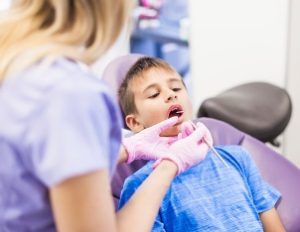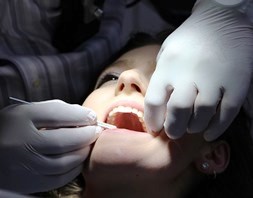Dental Hygiene Schools
How to Pick the Best One Near Twin Falls Idaho
 The most important first step to begin your new profession in preventive dentistry is to choose the right dental hygienist college near Twin Falls ID. But before you can make your selection, you need to assess and compare your school options. Selecting the college with the lowest tuition or enrolling in the program that is closest to your home is not the ideal way to make your decision. There are other important factors to take into account also, for instance the college's accreditation and reputation. A dental hygienist usually must spend anywhere from two to three years to complete an Associate Degree, as compared to a certificate typically earned by dental assistants in about half that time. Obviously with the lengthier training of a hygienist comes more cost. We will explore all of these considerations and additional questions that you need to be asking the dental hygienist programs you are evaluating later in this article. But first, let's explore the roles of dental hygienists and the training programs available.
The most important first step to begin your new profession in preventive dentistry is to choose the right dental hygienist college near Twin Falls ID. But before you can make your selection, you need to assess and compare your school options. Selecting the college with the lowest tuition or enrolling in the program that is closest to your home is not the ideal way to make your decision. There are other important factors to take into account also, for instance the college's accreditation and reputation. A dental hygienist usually must spend anywhere from two to three years to complete an Associate Degree, as compared to a certificate typically earned by dental assistants in about half that time. Obviously with the lengthier training of a hygienist comes more cost. We will explore all of these considerations and additional questions that you need to be asking the dental hygienist programs you are evaluating later in this article. But first, let's explore the roles of dental hygienists and the training programs available.
It Takes Just a Few Minutes to Start Your Dental Hygienist Career Below
Dental Hygienist Job Functions

When comparing the role of a dental assistant to that of a hygienist, the most significant difference is probably that the hygienist works more independently. Dental assistants work with and in support of the Twin Falls ID dentists and the practice. Hygienists, while also supporting the practice, deal with the patients more on an individual basis. They are frequently the first person a patient sees when called from the waiting area. They examine every patient's gums and teeth and report their findings to the dentists. They also may perform basic procedures. Based on state law, a hygienist's duties may include:
- Removing stains, tartar and plaque
- Administering fluoride treatments
- Applying sealants and polishing teeth
- Educating patients regarding oral care
- Taking and developing X-rays
- Applying fillings and removing sutures
Dental Hygienist Education Options
Because of the increased responsibility in contrast to an assistant, dental hygienists employed in Twin Falls ID dental offices are usually required to hold an Associate Degree in dental hygiene rather than a certificate. These programs can take anywhere from 2 to as long as 3 years to finish and must be accredited by the CDA in nearly every state. They are offered in community colleges as well as trade and technical schools. And in addition to classroom studies learning the fundamentals of dental hygiene, there will be a clinical aspect to the training as well. Some programs also offer internships with local dentists or dental practices.Online Dental Hygienist Schools
 Choosing an online dental hygienist college might be a good alternative for receiving your training. Just remember that the classes will not be 100% online, since there will be a clinical component to your training. But the rest of your classes will be accessible by means of your desktop computer in the convenience of your Twin Falls ID home or elsewhere on your tablet or laptop. For those working while going to college, online dental programs make education much more accessible. Many may even charge lower tuition rates than their on-campus counterparts. And additional expenses such as for commuting, books and school supplies may be lessened also. The practical training can often be performed at an area dental office or in an on-campus lab. With both the clinical and online training, everything required to get the appropriate education is provided. If you have the dedication for this mode of learning, you might find that enrolling in an dental hygienist online school is the ideal choice for you.
Choosing an online dental hygienist college might be a good alternative for receiving your training. Just remember that the classes will not be 100% online, since there will be a clinical component to your training. But the rest of your classes will be accessible by means of your desktop computer in the convenience of your Twin Falls ID home or elsewhere on your tablet or laptop. For those working while going to college, online dental programs make education much more accessible. Many may even charge lower tuition rates than their on-campus counterparts. And additional expenses such as for commuting, books and school supplies may be lessened also. The practical training can often be performed at an area dental office or in an on-campus lab. With both the clinical and online training, everything required to get the appropriate education is provided. If you have the dedication for this mode of learning, you might find that enrolling in an dental hygienist online school is the ideal choice for you.
Questions to Cover With Dental Hygienist Schools
Now that you have decided to become a dental hygienist in Twin Falls ID, you can start the procedure of comparing schools and programs. As we covered at the start of this article, many prospective students start by looking at the location and the cost of the colleges. Possibly they look for some online options also. Although these may be important initial considerations, there are several additional questions that you need to address to the programs you are comparing in order to make an informed decision. Toward that end, we have included a list of questions to assist you with your due diligence and ultimate selection of the best dental hygienist college for you.
Is the Dental College Accredited? There are several important reasons why you should only select an accredited dental hygienist school. If you are intending to become certified or licensed, then accreditation is a requirement in nearly all states. In order to take the National Board Dental Hygiene Examination, your dental school must be accredited by the Commission on Dental Accreditation (CDA). Accreditation also helps establish that the training you receive is of the highest quality and comprehensive. Twin Falls ID employers frequently prefer or require that new hires are graduates of accredited schools. And last, if you are applying for financial aid or a student loan, frequently they are not offered for non-accredited programs.
Is Adequate Clinical Training Included? Clinical or practical training is an important part of any dental training program. This is true for the online college options as well. Most dental hygienist programs have associations with local dental practices and clinics that provide practical training for their students. It's not only important that the school you choose offers adequate clinical hours but also provides them in the type of practice that you subsequently would like to work in. As an example, if you have an interest in a career in pediatric dentistry, confirm that the program you choose offers clinical rotation in a local Twin Falls ID dental office that focuses on dental care for children.
Is There an Internship Program? Ask if the dental schools you are considering sponsor an internship program. Internships are undoubtedly the ideal way to get hands-on, clinical experience in a real dental practice. They make it easier for students to transition from the theoretical to the practical. They can also help students establish professional relationships in the Twin Falls ID dentistry community. And they are attractive on resumes too.
Is Job Placement Help Provided? Many graduating students of dental hygienist schools need assistance obtaining their first job. Ask if the schools you are reviewing have job assistance programs, and what their job placement rates are. Programs with higher job placement rates probably have excellent reputations within the Twin Falls ID dental profession as well as broad networks of contacts where they can refer their students for employment or internships.
Are the Classrooms Smaller? Find out from the programs you are looking at how big on average their classrooms are. The smaller classes usually offer a more personal atmosphere for training where students have greater access to the instructors. On the other hand, large classes can be impersonal and provide little one-on-one instruction. If practical, ask if you can sit in on a few classes at the Twin Falls ID dental hygienist college that you are leaning toward so that you can witness first hand the degree of interaction between students and instructors before making a commitment.
What is the Total Cost of the Program? Dental hygiene colleges can vary in cost depending on the length of the program and the amount of practical training provided. Other factors, for instance the reputations of the schools and whether they are private or public also come into play. But in addition to the tuition there are other substantial expenses which can add up. They can include costs for such things as commuting and textbooks as well as school equipment, materials and supplies. So when comparing the cost of colleges, remember to include all of the expenses related to your education. The majority of schools have financial assistance offices, so be sure to check out what is offered as far as loans, grants and scholarships in the Twin Falls ID area.
Are the Classes Convenient? Before enrolling in a dental hygienist school, you must make sure that the assistant or hygienist program furnishes classes that suit your schedule. This is especially true if you continue working while receiving your education and have to attend classes near Twin Falls ID in the evenings or on weekends. And even if you enroll in an online school, you will still need to schedule your clinical training classes. Also, while making your inquiries, ask what the make-up protocol is if you should need to miss any classes because of illness, work or family emergencies.
Learn More About Studying to Become a Dental Hygienist in Twin Falls
Enroll in the Right Twin Falls Dental Hygienist Program
Enrolling in the ideal dental hygienist program is essential if you wish to take the National Board Dental Hygiene exam or, if mandated in your state, become licensed. As you now know, there are numerous alternatives available to receive your training and it takes a relatively short amount of time to become a dental hygienist. You can acquire your formal training through dental hygienist programs at junior colleges, technical institutes, trade schools and vocational schools. Graduates of these schools normally obtain an Associate Degree. Dental Hygienists usually require about 2 years of studies prior to entering the work force. When pursuing a degree you can elect to attend classes online or on-campus. Whichever mode of training you decide to pursue, by addressing the questions provided in this article you will be in a better position to make the appropriate choice. And by doing so, you will be ready to start your journey toward becoming a dental hygienist in Twin Falls Idaho.
Twin Falls Dental Hygiene Schools | Twin Falls Dental Hygienist Programs Near Me
